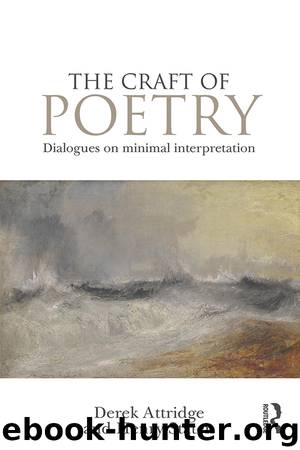The Craft of Poetry by Attridge Derek Staten Henry

Author:Attridge, Derek, Staten, Henry
Language: eng
Format: epub
Publisher: Taylor and Francis
The more one learns, the deeper and more painful the irony becomes; but as you’ve demonstrated, it resonates in the words even if one knows none of it. This is an almost laboratory demonstration of the way “the text itself” takes up into the organization of its energies the force of a context that need not be deeply delved into to make its presence felt, and felt in the distinctive way that poetry can make it felt. I always feel reservations about bringing historical facts like these into the picture, because I’m afraid there are readers who will understand whatever power they feel the poem to have as no more than the delegated power of the facts themselves.
And after all, powerful as it is, “Way Down South in Dixie” is only an ironic citation, not Hughes’s own words, where his art most fully shows itself; for example in the transition from the first line to the second. The capitalization of the first line (which you note) emphasizes the citational quality of the words – the public, anthemic quality of the voice by which these words would be spoken outside the context of this poem (a voice that historically, we’ve learned, was posited by white composers as the voice of a black slave longing for the South). And the separation between this citationality and the intensely personal quality of the voice into which it modulates in the second line is heightened by the placing of the second line in parentheses. The irony is so fierce, the cause of suffering that is about to be revealed so stark, that the inexhaustible image of a heart breaking, especially in the private enclosure of the parenthesis, is brought back to full life once more. I think you’re absolutely right that the separation of “cross” from “roads” brings the first word to our attention in a way that alludes to the Lord Jesus who will be mentioned in the next stanza. It would be interesting to know whether Hughes was familiar with the use of “tree” for “cross,” but ultimately it doesn’t matter, both because he clearly means this tree to resonate with the cross, and because the same linguistic dynamics that generated the medieval use of “tree” re-generate the analogy between tree and cross here. There is something tree-like about the cross. But we shouldn’t forget that this is literally a tree at a crossroads, because this adds another dimension of savagery to the lynching: the body has been placed where the most people pass by, to make it a maximally public spectacle, gratifying some passersby and breaking the heart of others.
Your observations about the rhythm of “Bruised body” nicely bring out the subtlety of Hughes’s art. I note additionally the delicately chiasmic relation of the stanza’s first and second lines in their movement from “Down” to “high.”
Way Down South in Dixie
(Bruised body high in air)
The next two lines on the one hand would bear more glossing than we have time to give them,
Download
This site does not store any files on its server. We only index and link to content provided by other sites. Please contact the content providers to delete copyright contents if any and email us, we'll remove relevant links or contents immediately.
| Books & Reading | Comparative Literature |
| Criticism & Theory | Genres & Styles |
| Movements & Periods | Reference |
| Regional & Cultural | Women Authors |
4 3 2 1: A Novel by Paul Auster(12375)
The handmaid's tale by Margaret Atwood(7757)
Giovanni's Room by James Baldwin(7326)
Asking the Right Questions: A Guide to Critical Thinking by M. Neil Browne & Stuart M. Keeley(5757)
Big Magic: Creative Living Beyond Fear by Elizabeth Gilbert(5754)
Ego Is the Enemy by Ryan Holiday(5413)
The Body: A Guide for Occupants by Bill Bryson(5080)
On Writing A Memoir of the Craft by Stephen King(4935)
Ken Follett - World without end by Ken Follett(4723)
Adulting by Kelly Williams Brown(4565)
Bluets by Maggie Nelson(4547)
Eat That Frog! by Brian Tracy(4525)
Guilty Pleasures by Laurell K Hamilton(4439)
The Poetry of Pablo Neruda by Pablo Neruda(4097)
Alive: The Story of the Andes Survivors by Piers Paul Read(4018)
White Noise - A Novel by Don DeLillo(4002)
Fingerprints of the Gods by Graham Hancock(3996)
The Book of Joy by Dalai Lama(3976)
The Bookshop by Penelope Fitzgerald(3844)
